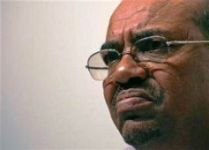FEATURE: Sudan president delivers “State of denial” speech in Darfur
By: Wasil Ali
July 22, 2007 (WASHINGTON) — “Most of Darfur enjoys peace and security and people are leading a normal live as we ascertained from meeting the people” is what the Sudanese president Omar al-Bashir told the cabinet and the world from the city of Al-Fasher in North Darfur.

As usual al-Bashir would not forsake this opportunity without acting like Don Kikhot who is fighting windmills. His favorite targets of course were the US and UK. He challenged the leaders of both countries to stand before the Iraqis in Baghdad the way he did in Darfur. Perhaps if he stood before Darfur refugees in the IDP camps his statement would have been more credible.
But Sudan’s president had an all-purpose answer for the drama surrounding Darfur, Iraq. In his eyes US President George W. Bush and British Prime Minister Gordon Brown are exaggerating Darfur’s problems in order to hide their “failure” in Iraq.
It is interesting to note that when the Darfur conflict erupted al-Bashir consistently spoke of his ability to obliterate the Darfur rebel groups in a matter of a week. In December of 2003 the Sudanese president Omar Hassan al-Bashir said that the Darfur rebels have been “annihilated”. But the reality as the former UN special representative to Sudan Jan Pronk revealed, was that Sudanese soldiers were refusing to fight and the army is losing one battlefield after another in Darfur. Today the Sudanese regime is desperately seeking to negotiate with the rebel groups that they previously treated them as non-existent. In my opinion this meets the criteria of ‘failure’.
And as a leader of one of the most corrupt nations in the world, per transparency organization ratings, al-Bashir expressed his appreciation to humanitarian agenicies working in Darfur by accusing them of collecting money and using it for purposes other than aiding refugees. As expected he provided no details of this serious allegation.
Al-Bashir avoided any mention of his government’s acceptance of the peacekeeping force in Darfur. Perhaps his advisors told him that statements he made before weakened his position internally when he came to reverse them. Sudan’s unconditional acceptance of the international force has shocked a large number of his supporters who could not believe that their president gave up so easily after all the fairy tales he fed them on these forces.
Following Sudan’s unconditional acceptance of the hybrid force it was only junior foreign ministry officials made statements in this regard. All other senior officials remained silent. Then Al-Bashir finally made sarcastic comments and promised that all IDP’s will return to their homes before August and thus the peacekeeping force “will have nothing to do”. Yet he could not hide his bitterness and accused the Sudanese media of “weakening Sudan’s position and leading the government to accept the peacekeeping force”.
The ruling National Congress Party (NCP) has lost whatever credibility it had following Khartoum’s acceptance of the hybrid force. No one was to blame but Al-Bashir who made promises and threats he could not fulfill. Then the Los Angeles Times uncovered that Sudanese intelligence is acting as a proxy agent for the CIA. So what was the almost daily blasting of the US by Sudan’s president all about? Of course al-Bashir denied it and said that his government cooperates with the CIA within Sudan’s borders. This was in sharp contrast with former Sudanese foreign minister Mustafa Osman Ismail who told the Los Angeles Times in 2005 that his government “served as the eyes and ears of the CIA in Somalia, a sanctuary for Islamic militants”.
To add insult to injury Sudan witnessed the worst floods in years and the government appeared totally paralyzed, generating severe criticisms from the media and the victims who even clashed with the police protesting inadequate help. Al-Bashir used to boast that before he came to power Sudan relied on international help to deal with natural disasters. Perhaps this is why the government declined to declare flood stricken regions as disaster areas.
In the midst of all that Al-Bashir told the Sudanese people in a speech a few weeks ago that “no one can remove us from power” thus escaping the real issues the country faces. A couple of days later a leader of an opposition party was arrested and accused of attempting to stage a coup which has been downgraded later to a “sabotage plot”. Then at first there was foreign involvement in the plot but was denied later then again confirmed. Surprisingly Sudanese presidential adviser Nafi Ali Nafi admitted that they have found none of the weapons they alleged to have been transported into Khartoum. All in all hardly anyone in Sudan believed the government’s story on the plot. Most likely it was another escape tactic on the part of the regime to divert attention from the isolation it is facing.
Undoubtedly, Sudan’s Bashir is under a great deal of pressure these days. He made a rare confession recently that there are problems within his party. On top of that the NCP is trading fierce accusations with their partners in power, the SPLM over long standing issues waiting to be resolved. Last but not least he is trying to work his way out of his unconditional acceptance of the UN-AU hybrid force. How far can he go? Only time will tell.
(ST)
